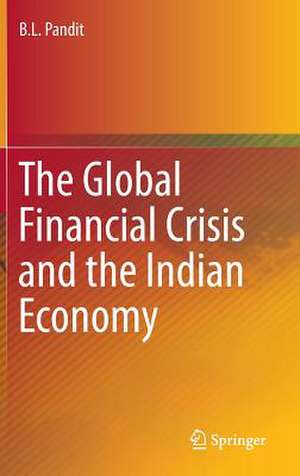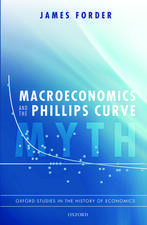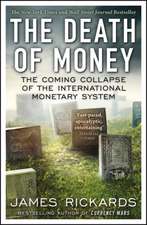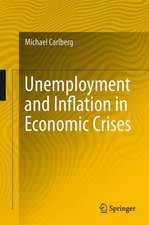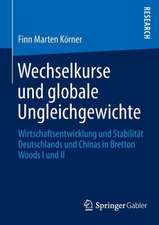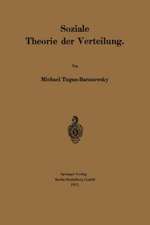The Global Financial Crisis and the Indian Economy
Autor B. L. Panditen Limba Engleză Hardback – iun 2015
| Toate formatele și edițiile | Preț | Express |
|---|---|---|
| Paperback (1) | 354.36 lei 38-44 zile | |
| Springer India – 23 oct 2016 | 354.36 lei 38-44 zile | |
| Hardback (1) | 367.70 lei 38-44 zile | |
| Springer India – iun 2015 | 367.70 lei 38-44 zile |
Preț: 367.70 lei
Nou
Puncte Express: 552
Preț estimativ în valută:
70.37€ • 76.41$ • 59.11£
70.37€ • 76.41$ • 59.11£
Carte tipărită la comandă
Livrare economică 19-25 aprilie
Preluare comenzi: 021 569.72.76
Specificații
ISBN-13: 9788132223948
ISBN-10: 8132223942
Pagini: 180
Ilustrații: XI, 142 p. 31 illus.
Dimensiuni: 155 x 235 x 15 mm
Greutate: 0.4 kg
Ediția:2015
Editura: Springer India
Colecția Springer
Locul publicării:New Delhi, India
ISBN-10: 8132223942
Pagini: 180
Ilustrații: XI, 142 p. 31 illus.
Dimensiuni: 155 x 235 x 15 mm
Greutate: 0.4 kg
Ediția:2015
Editura: Springer India
Colecția Springer
Locul publicării:New Delhi, India
Public țintă
ResearchCuprins
Chapter 1: Introduction.- Part A The Systemic Issues of the Global Crisis.- Chapter 2: Genesis of the Global Financial Crisis.- Chapter 3: Financial Liberalization, Economic Development and Regulation.- Chapter 4: Towards a New International Monetary System.- Part B Global Crisis and Indian Economy.- Chapter 5: Monetary Policy Transmission: Cointegration and Vector Error Correction Analysis.- Chapter 6: Monetary Policy and Credit Demand during the Crisis.- Chapter 7: Global Financial Crisis and the Indian Stock Market.- Chapter 8: Indian Economy through the Global Crisis.- Chapter 9: Conclusions.
Notă biografică
B L Pandit has served as a professor and head, Department of Economics, Delhi School of Economics. He got his PhD in Economics from Delhi School of Economics, University of Delhi. He has taught courses in macroeconomic theory, monetary theory and policy and financial markets at the Delhi School of Economics besides supervising M Phil and PhD students. He has published books with international publishers and has also published extensively in peer reviewed national and international journals. His research project studies have been sponsored by Canadian International Development Agency, FICCI and Reserve Bank of India. He has presented papers and attended conferences in Toronto, Moscow and UNCTAD Geneva.
Textul de pe ultima copertă
After tracing the causes of the global financial crisis, the book focuses on two fundamental systemic issues connected with its manifestation: financial-sector regulation and the problem of the dollar-centric international monetary system, both of which have been widely cited among the important factors leading to the 2008 financial crisis. The important analytical question of monetary policy transmission during the crisis is discussed in depth with the help of appropriate econometric models. The effectiveness of India’s monetary policy during the crisis is examined by specifying an econometric model, and the impact of the crisis on the Indian stock market is modelled on the basis of risk-enhancing and risk-mitigating features. In closing, the impact of the crisis on real sectors of the Indian economy is analysed in detail.
Caracteristici
Combines analytical models of regulation with the practical need for regulation of the financial sector Uses state of art econometric models to characterise the monetary policy transmission and examine its effectiveness Assess the impact of the crisis on the Indian stock market during the global financial crisis Includes supplementary material: sn.pub/extras
